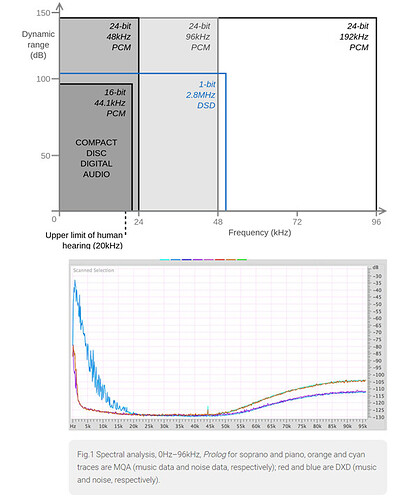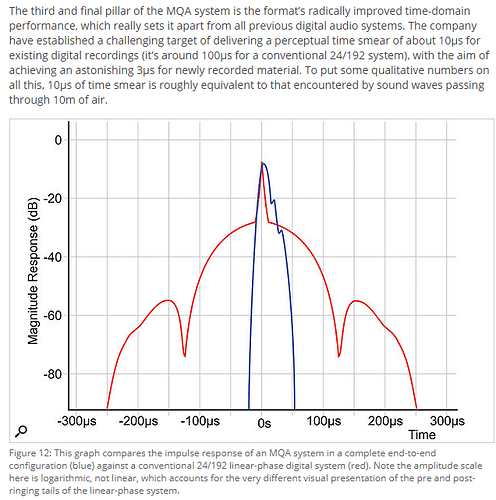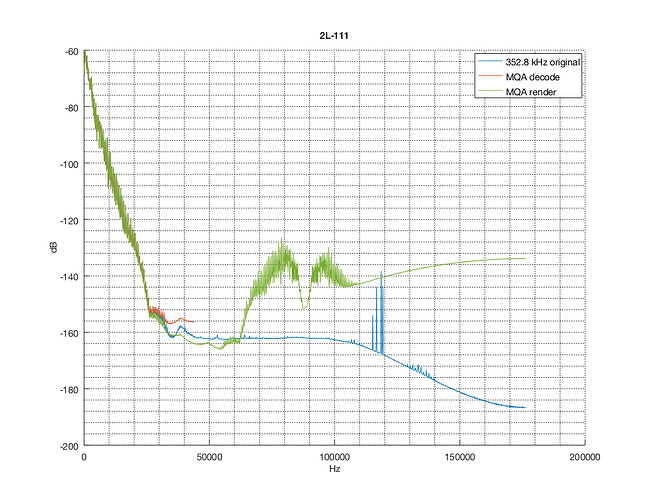An excellent rebuttal by Wim, I must admit.
Peter I do believe this shows where the cut off frequency lies and that the frequencies above 21-23 kHz is merely a DSP mirroring. Note this behavior is present in recordings where the recordings are not containing signal to hide the cut off.
Hi Kenneth,
It’s very obvious that you cannot reconstruct 24/192 or 24/352.8 from a 24/96 1st (un)fold only without unfolding 2nd and 3rd as well. You know that 24/96 PCM is brick-walled at 48 kHz, so how can you explain the perfect match of MQA unfold with the original DXD recording? The analogue output does not lie.
What analog measurements exactly? All the processing that relates to MQA is in the digital realm. The aim is to verify the claims that there is more than 1 origami unfold that isn’t just up-sampling.
The file in the diagram you posted was given to Stereophile to measure. It is not proof that actually commercially available MQA “Masters” have more than one unfold. To prove that, as I’ve now stated twice, you’d need to take the digital output of a DAC that is reportedly capable of the full unfold process, after it has unfolded the files. Again, you CANNOT prove this with a file that has not been folded in the first place!
Given that the MQA group for a fact has been dishonest from the very start about the content of MQA files (from when they first stated, as shown in the initial Stereophile article, that they were lossless, when they were not) any file from them has to be treated as suspect.
There are MULTIPLE measurements avaiable and you will find them on the web. At the end, any DAC will convert the digital signal into an audible analog signal isn/t it…?
MQA is a holistic process, working end-to-end and you will hear the improvement easily.
https://www.soundonsound.com/techniques/mqa-time-domain-accuracy-digital-audio-quality
The issue that You conveniently avoid here is the fact that this recording is done in 24/44 and that there is no signal from around 21 kHz. Yet MQA parades this recording as a 24/ 88-176 “Master” It also shows how MQA “recreates” the highest frequencies. Note that if You take the part in front of the MQA gap, mirror it, turn it down by loads of dB. You get that exact result shown in the pic.
You are right the measurements don’t lie
This measurement shows the (lack of) precision in the lossy MQA “format”
As per one of my previous posts, the time domain effects on an illegal signal – an impulse response, bare no relation to the effects on an in-bandwidth musical signal. The pre- and post- tails are the result of the correct behaviour of a digital filter removing out-of-band signals. The narrow response of the impulse after being passed through the MQA filter shows that it does NOT filter out out-of-band high-frequency noise as it should, but leaks. That also means that it will cause time-domain smear, the opposite of what MQA claims to do.
Peter You are aware that this “measurement” is a theoretical representation of how MQA claims their filters improve the time domain. The graph is by the way supplied by…MQA
Please show any independant measurement that confirms that MQA can improve the accuracy of a recording.
The digital filter IS the problem. Please take time to study MQA.
https://www.jas-audio.or.jp/jas_cms/wp-content/uploads/2015/09/201509-008-019.pdf
I have taken the time. This is why I can say that that MQA’s digital filters cause problems, rather than solve them. I suggest you learn how digital filtering is supposed to work, instead of parroting marketing materials and AES papers that have major technical issues.
We listen to music, not impulse responses.
Music is analog and so is our hearing. MQA is getting the analog along a digital pipeline with minimum of damage than a few metres of air. This I appreciate they achieve from my listening experience based on plenty of exposure to live music and how it sounds.
My perception is the only thing that counts for me as others dive in to the theoretical and esoteric.
I’m sorry, I just cannot hear the distortions they claim, all I experience is natural sounding realistic music…
Well, if you were an authority like Bob Stuart and Peter Craven, your opinion would mean something to me, but sorry…
I agree with you that what we need to do is LISTEN to music to understand what MQA achieves - cheers 
As Carl Sagan would say: “One of the great commandments of science is, “Mistrust arguments from authority.” … Too many such arguments have proved too painfully wrong. Authorities must prove their contentions like everybody else.”
You have used this “appeal to authority” fallacy elsewhere in at least one other forum - discrediting other’s opinions with the assertion that their experiences and knowledge are discounted in the face of an authority not actually in the argument to verify your supposition.
It is also noteworthy that these and other arguments presented by you in other forums have been shown to be inconclusive at best, and roundly debunked at worst. It’s uncanny what a search engine can return when given a name and a three letter acronym.
Whatever… just read their patents and papers and try to learn something new. That is what I do and MQA appeals to me a lot, the authority behind it is also credible, so fine with me.
Sorry but Bob & Peter are NOT authorities, in this connection (MQA) they are marketeers. They have a product that they are selling. They used to (unsuccessfully) try to sell Meridian products. They later found out that licensing is paying better, they then came up with a pseudoformat to license. Sadly for them ALL their marketing have now been debunked.
It isn’t lossless
It doesn’t improve time smearing
It isn’t Hires
It can not reproduce more than 15 bits of Dynamic nor any frequency above 23 kHz
and the list goes on
Music is actually acoustic…
The speakers/headphones are converting an electric signal to an acoustic “signal”
Analog is a description of how the signal is stored. Analog is the wavey stuff digital is the numbers stuff. But anything Your ears can hear is acoustic.
mqa, suffers from the the same thing every other recording suffers from… you can also relate it to video codecs, I guess you could even relate it to learning and reading… Crap in, Crap out.




